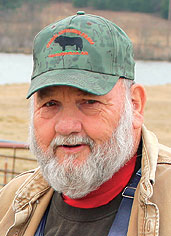 Travis Ballard lives a little north of Charleston, Ark., just across from his son, T.K. Ballard. Father and son raise broiler chickens and Red Angus cattle, and share heavy equipment, fences and ideas about farming.
Travis Ballard lives a little north of Charleston, Ark., just across from his son, T.K. Ballard. Father and son raise broiler chickens and Red Angus cattle, and share heavy equipment, fences and ideas about farming.
“We have different farms,” said T.K. “I help him and he helps me, the biggest thing is we share equipment, and that helps keep costs down.”
Travis runs around 190 Red Angus on 210 acres, and oversees four broiler houses that produce 96,400 chickens per flock. T.K.’s spread is 160 acres, with another 300 leased, and six broiler houses that produce 160,400 chickens per flock. Farming and ranching roots run deep in the Ballard family, beginning with a dairy farm that started almost two decades before America entered World War II.
“My grandpa, James A. King, started with the first Jersey heifers here in 1923,” said Travis.
Both Travis and T.K. told the story of how one particularly mean young bull caused them to decide to raise Red Angus cattle.
The Ballard’s researched sire directories, obtained Tarentaise semen, and began breeding some Jersey cattle with it.
But some of the calves turned out to have more attitude than the Ballards wanted to deal with.
“We had one bull calf that we couldn’t catch,” said Travis. “We got him in the corral but he just tore the place down and got loose. It was three weeks or a month before we got him.” Travis recalled how the young bull tried to get at him as he straddled the top of the corral panel, and knocked the breath out him before finally walking into the trailer.
“He literally tore the corral down,” said T.K. “Most of it fell on dad. Once we got him in the trailer, we just kept him in there. We fed and watered him in the trailer for several days until we sent him to the sale.” T.K said.
Mild temperament was one of the qualities that attracted the Ballards to Red Angus, and is a trait they aggressively select for. “We just don’t mess with any that show the slightest bit of meanness,” said T.K. “If I can’t walk up and physically put my hands on a bull, we’re not interested.”
Both Travis and T.K. look for Red Angus bulls with low maintenance energy EPD numbers.
“The days of being able to feed cattle a lot of grain are pretty much over,” said T.K. “Our cattle have got to be able to maintain weight on grass. We have to keep inputs as low as possible, and keep our genetics profitable. It’s extremely critical to have zero or minus EPD for maintenance.”
In addition to Red Angus, both father and son raise broiler chickens, which doubles the farm workload. T.K. put in a 35,000 gallon water storage tank for his six broiler houses, and constructed a chicken house command center with air conditioning, satellite TV, a fridge and furniture.
“I’ve got everything up here except a washer, dryer and stove,” said Michele, T.K.’s wife. “At peak demand, we’ve got to put out about 84 or 85 gallons a minute,” said T.K. “We found out early that the city water system couldn’t keep up with us, so we stockpile.”
Michele’s son, Weston Martin plans to continue the family tradition of working in agriculture, and is majoring in agricultural business at Arkansas State University.
Both Travis and T.K. see getting younger people involved in agriculture as vital, and think that financial help is the key to helping new farmers get started.
“It costs so much anymore to start a farm,” said Travis. “A million dollars is just a drop in the bucket. We’ve got to get older people who care to help the new farmers get started.”
Despite the long hours and difficulties in getting started, neither Travis nor T.K. can see themselves doing anything else.
“There is not a job anywhere in the world with any amount of pay that could pull me away,” said T.K. “I was born to do this.







